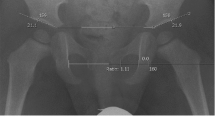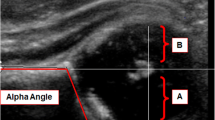Abstract
Background
The methods used for any screening programme for developmental dysplasia of the hip (DDH) can be controversial. This was an opportunistic audit of our selective ultrasound screening programme using an X-ray at 5 months to prevent inappropriate discharge due to the learning curve of ultrasound.
Methods
Between 1990 and 2004 in Nottingham, UK, out of a total population of 108,500 births, approximately 11,500 neonates were screened using ultrasound. Any child with an ultrasound scan showing Graf α-angles greater than 60° (Graf Type I) with the hip in joint were discharged from the clinic. All of those discharged were subsequently X-rayed at 5 months in order to cover the learning curve of ultrasound. The X-rays were reviewed by a consultant radiologist and referred back to orthopaedics if there was lateralisation of the femoral head or an acetabular index above 30°.
Results
Of approximately 11,000 X-rays performed, only 53 patients were referred back to orthopaedics, of which 47 had a complete data set. Of these 47 children, only 8 (17%) required intervention. On review of the original ultrasounds, Graf’s α-angle did not seem to correlate well with the need for intervention, as all were Type I hips. The femoral head cover (FHC) appeared to be more predictive of the need for treatment. There have been no late presentations to our unit of DDH following a normal 5-month X-ray.
Conclusions
We now check the Graf α-angle, FHC and dynamic stability in the ultrasound assessment and only perform X-ray at 5 months if there was a low α-angle or low FHC. Since this change, there have been no late presentations of DDH from the population screened by ultrasound.




Similar content being viewed by others
References
Ortolani M (1937) Un segno poco noto e sua importanza per la diagnosi precoce di prelussazione congenita dell’anca. Pediatria 45:129–136
Barlow TG (1962) Early diagnosis and treatment of congenital dislocation of the hip. J Bone Joint Surg Br 44-B:292–301
Andersson JE, Funnemark P-O (1999) Neonatal hip instability: screening with anterior-dynamic ultrasound method. J Pediatr Orthop 15:322–324
Dogruel H, Atalar H, Yavuz OY, Sayli U (2008) Clinical examination versus ultrasonography in detecting developmental dysplasia of the hip. Int Orthop 32(3):415–419
Paton RW, Hinduja K, Thomas CD (2005) The significance of at-risk factors in ultrasound surveillance of developmental dysplasia of the hip. A ten-year prospective study. J Bone Joint Surg Br 87-B:1264–1266
Foster BK (1995) Initial screening and diagnosis of and referral for developmental dysplasia of the hip. Curr Opin Pediatr 7:80–82
McKinstry B, MacNicol M, Elliot K, MacPherson S (2005) The transition from learner to provider/teacher: the learning needs of new orthopaedic consultants. BMC Med Educ 5(1):17
Tredwell SJ (1992) Neonatal screening for hip joint instability. Its clinical and economic relevance. Clin Orthop Relat Res 281:63–68
Sponseller PD (1995) Screening and ultrasound for neonatal hip instability. Curr Opin Pediatr 7:77–79
Peled E, Bialik V, Katzman A, Eidelman M, Norman D (2008) Treatment of Graf’s ultrasound class III and IV hips using Pavlik’s method. Clin Orthop Relat Res 466(4):825–829
Elbourne D, Dezateux C, Arthur R, Clarke NM, Gray A, King A, Quinn A, Gardner F, Russell G; UK Collaborative Hip Trial Group (2002) Ultrasonography in the diagnosis and management of developmental hip dysplasia (UK Hip Trial): clinical and economic results of a multicentre randomised controlled trial. Lancet 360:2009–2017
Taylor GR, Clarke NM (1997) Monitoring the treatment of developmental dysplasia of the hip with the Pavlik harness. The role of ultrasound. J Bone Joint Surg Br 79-B(5):719–723
Vedantam R, Bell MJ (1995) Dynamic ultrasound assessment for monitoring of treatment of congenital dislocation of the hip. J Pediatr Orthop 15:725–728
Paton RW, Hossain S, Eccles K (2002) Eight-year prospective targeted ultrasound screening program for instability and at-risk hip joints in developmental dysplasia of the hip. J Pediatr Orthop 22:338–341
Shipman SA, Helfand M, Moyer VA, Yawn BP (2006) Screening for developmental dysplasia of the hip: a systematic literature review for the US Preventive Services Task Force. Pediatrics 117(3):e557–e576
Roovers EA, Boere-Boonekamp MM, Castelein RM, Zielhuis GA, Kerkhoff TH (2005) Effectiveness of ultrasound screening for developmental dysplasia of the hip. Arch Dis Child Fetal Neonatal Ed 90(1):F25–F30
Lewis K, Jones DA, Powell N (1999) Ultrasound and neonatal hip screening: the five-year results of a prospective study in high-risk babies. J Pediatr Orthop 19(6):760–762
Marks DS, Clegg J, al-Chalabi AN (1994) Routine ultrasound screening for neonatal hip instability. Can it abolish late-presenting congenital dislocation of the hip? J Bone Joint Surg Br 76-B:534–538
Holen KJ, Tegnander A, Bredland T, Johansen OJ, Saether OD, Eik-Nes SH, Terjesen T (2002) Universal or selective screening of the neonatal hip using ultrasound? A prospective, randomised trial of 15,529 newborn infants. J Bone Joint Surg Br 84-B:886–890
Sucato DJ, Johnston CE 2nd, Birch JG, Herring JA, Mack P (1999) Outcome of ultrasonographic hip abnormalities in clinically stable hips. J Pediatr Orthop 19(6):754–759
Gray A, Elbourne D, Dezateux C, King A, Quinn A, Gardner F (2005) Economic evaluation of ultrasonography in the diagnosis and management of developmental hip dysplasia in the United Kingdom and Ireland. J Bone Joint Surg Am 87-A(11):2472–2479
Elliman DA, Dezateux C, Bedford HE (2002) Newborn and childhood screening programmes: criteria, evidence, and current policy. Arch Dis Child 87:6–9
Graf R (1980) The diagnosis of congenital hip-joint dislocation by the ultrasonic Combound treatment. Arch Orthop Trauma Surg 97:117–133
Falliner A, Schwinzer D, Hahne H-J, Hedderich J, Hassenpflug J (2006) Comparing ultrasound measurements of neonatal hips using the methods of Graf and Terjesen. J Bone Joint Surg Br 88-B:104–106
Holen KJ, Terjesen T, Tegnander A, Bredland T, Saether OD, Eik-Nes SH (1994) Ultrasound screening for hip dysplasia in newborns. J Pediatr Orthop 14:667–673
Engesaeter LB, Wilson DJ, Nag D, Benson MK (1990) Ultrasound and congenital dislocation of the hip. The importance of dynamic assessment. J Bone Joint Surg Br 72-B(2):197–201
Graf R (1987) Guide to sonography of the infant hip. Thieme Medical Publishers, New York
Morin C, Harcke HT, MacEwen GD (1985) The infant hip: real-time US assessment of acetabular development. Radiology 157:673–677
Arumilli BR, Koneru P, Garg NK, Davies R, Saville S, Sampath J, Bruce C (2006) Is secondary radiological follow-up of infants with a family history of developmental dysplasia of the hip necessary? J Bone Joint Surg Br 88-B:1224–1227
[No authors listed] (1992) Conclusions of Consensus Conference on the screening or congenital hip dislocation. Paris, 4 November 1991. Arch Fr Pediatr 49(2):145–146
Acknowledgments
We would like to make the following acknowledgement: Dr. P. Twining, Consultant Radiologist at the University Hospital of Nottingham, UK. Dr. Twining was a highly respected radiologist at this institution for a number of years and helped to set up the hip screening programme in this region. Although he sadly passed away last year, his contribution to the hip service and in the setting up of this paper will always be remembered.
Author information
Authors and Affiliations
Corresponding author
About this article
Cite this article
Price, K.R., Dove, R. & Hunter, J.B. The use of X-ray at 5 months in a selective screening programme for developmental dysplasia of the hip. J Child Orthop 5, 195–200 (2011). https://doi.org/10.1007/s11832-011-0338-2
Received:
Accepted:
Published:
Issue Date:
DOI: https://doi.org/10.1007/s11832-011-0338-2




